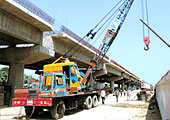|
If
the job outlook forecast is any indication, the Indian economy
will not be slowing down anytime soon. Sure, quarter-on-quarter,
the net employment outlook may not have shown any dramatic rise,
but the bottomline is: India's employment bazaar is humming-with
net employment outlook (calculated as the difference between the
proportion of respondents reporting an increase in their hiring
and those expecting a decline, expressed as a percentage) standing
at 82 per cent, up one percentage point over the last two quarters.
Spread across eight cities-Mumbai, Delhi,
Bangalore, Kolkata, Chennai, Pune, Hyderabad and Ahmedabad-the
survey drew responses from 490 companies. While there wasn't much
change in the survey results for the third quarter compared to
the second quarter, a few trends did come to notice. It's continuing
tough luck for people living in tier-II cities as opposed to their
brethren in metro and class I cities; an overwhelming 95 per cent
of the respondents reiterating their intention to hire from metro
and class I cities-a marginal drop of one percentage point from
the previous quarter's 96 per cent.
It's Still Raining Jobs
Gone are the days when one had to grin and
bear it until one found an alternative. Jobs are being created
across the entire spectrum of the economy. And by all accounts,
it is not a fad for the season but a trend that's gathering momentum.
Of course, the prima donna sectors remain the same as in the second
quarter-IT, ITEs, financial services, retail, media and FMCG,
infrastructure and manufacture and engineering. Retail has notched
up an impressive gain of 8 per cent over the second quarter. Says
R. Subramanian, MD, Subhiksha: "It's not at all surprising.
If you just add up the expansion plans that each player has announced
in the retail sector, the hiring needs of the industry become
very obvious. Media, too, has come up in a major way, with a lot
of focus on digital media, the introduction of CAS and DTH and
also the boom in internet media with IPTV."
IT and ITEs, on the other hand, have actually
declined by 2 per cent and 5 per cent, respectively. But even
so, the numbers for it and ITEs are cumulatively still the highest-which
means the decline is just a temporary blip on the radar. "We
have tapped may be 5 per cent of the potential addressable market
in India and we believe that the momentum will continue going
forward," says T.V. Mohandas Pai, Director, HR, at Infosys
Technologies. In fact, both Infosys and Wipro each expect to add
another 20,000 people to their payrolls in the current quarter.
Infrastructure is another sector that is
expected to see a rise in employment numbers; 78 per cent of the
respondents in this sector reported an increase in their hiring
needs over the current quarter compared to 71 per cent in the
previous quarter. "The business confidence looks positive.
The retail industry boom is resulting in both Indian companies
and MNCs entering into textile, infrastructure and the realty
sectors. This is a reflection of opportunities and growth for
companies across the country at both the macro and micro levels,"
observes Sampath Shetty, Vice President, Permanent Staffing, TeamLease
Services.
Talk of the Towns
So where does one work? Mumbai remains a
favourite, with more companies there announcing their intention
to hire people this quarter compared to the last-93 per cent against
90 per cent. Bangalore, which was the joint topper with the country's
commercial capital in the last survey, inches ahead this time-with
94 per cent of the respondents reporting an increase in their
hiring needs. But the major surprise this time has come from Chennai-a
power surge of 19 percentage points propels it to joint second
with Mumbai at 93 per cent. "Apart from the traditional manufacturing
segments-leather and textiles-the city's it and ITEs sectors are
also growing faster than the national average in terms of manpower
recruitment. The telecom and electronics sectors are also fuelling
the demand for human resources," informs K. Pandia Rajan,
Managing Director and CEO, Ma Foi Consultants.
Indeed, with Rs 15,000 crore of big ticket
private sector investments in the telecom and auto sectors already
announced and 35 million square feet of space needed for the burgeoning
it and ITEs sector by 2010-which will absorb 4 lakh people-the
city is on a roll. "Add to that the 10-12 integrated townships
and the 18 malls that are on the anvil and Chennai could well
emerge as an industrial El Dorado of the decade," says A.
Shankar, Deputy GM, Trammell Crow Meghraj.
Adds Yashovardhan Verma, Director (HR), LG
Electronics India: "What also goes in Chennai's favour is
that salary levels there are lower than those of even Pune (a
class I city). And though the skill sets are a bit lacking, the
people are hardworking."
Also to be noted is that while companies
are going big on recruitment, they want more full-time workers
and are gradually chucking out the part-time system.
| METHODOLOGY |
| The Business
Today-Teamlease Employment outlook survey, which follows a
rigorous, statistically validated process adhering to the
highest standards in market research, was conducted among
490 companies selected from the Centre for Monitoring Indian
Economy database, from NASSCOM for it companies and from companies
registered with the website of www.bpoindia.org for ITEs companies.
A combination of database and random sampling as a technique
has been used. Care was taken to ensure a good mix of large,
medium and small companies as also an equitable representation
across industries to remove any bias or variation that might
be attributable to a particular industry. The target respondents
at these companies were the hr heads or decision makers in
the hiring process. The questionnaire used for the survey
collated information on overall business improvement (last
three months and next three months); overall recruitment needs
(last three months and next three months) and recruitment
trends (across age, geographies, cities, functions and levels).
A total of 490 interviews were conducted during August and
September over telephone and responses obtained were coded
at the time of data collection. The information was then analysed
using the Statistical Package for Social Sciences software,
which is used by research and consulting companies worldwide.
Given the concentration of companies in Mumbai, Delhi, Kolkata,
Chennai, Bangalore, Hyderabad, Pune and Ahmedabad, the study
was restricted only to companies with a presence in these
cities. A random sampling was drawn from each city with due
weightage to size. Two indices, The Employment Outlook Index
and the Business Outlook Index were computed to elaborate
and analyse the trends that emerged from the data. |
Sourcing Pockets
Big is better-so seems to be the mantra of
the surveyed companies, which reiterated their intention to largely
recruit from metros and class I cities. "The larger cities
have a sizeable placeable population whose aspirations are manageable.
Their skill sets are synchronised to the needs of the recruiters
and they also understand the culture of the city where these companies
operate," observes Venkatesh Shastry, Partner, Stanton Chase
Consultants, a leading executive search firm. Agrees Kris Laxmikanth,
CEO, The Headhunters, a Bangalore-based hr consultancy: "For
both employers and recruits, larger cities are much better equipped
in terms of schools, hospitals and entertainment, despite an apparent
breakdown in infrastructure."
It's quite obvious that with the new sunrise
sector of retail coming up in a big way, new entrants want people
trained to handle operations from Day I and save themselves the
trouble of investing in enhancing their skill sets. That, in turn,
has the potential of creating a vicious merry-go-round wherein
a person is willing to go job hopping at the drop of a larger
penny. "The challenge for organisations will be to match
the demand and supply of manpower to optimise their market share
in this economy growth," feels Shetty of TeamLease.
However, Sanjay Jog, Head (HR), of Future
Group, feels companies can't afford to ignore non-metros. "I
don't agree that 95 per cent of employers expect to hire in metro
and class I towns. The top eight cities are growing; but so are
the smaller places. A lot of our hirings happen in places like
Bhavnagar, Indore, Kolhapur, Ambala and Meerut; we have stores
and outlets in all those towns; so naturally, we hire people from
there," he points out.
Three Degrees of Separation
Among the junior, middle and senior management
levels, a majority of the respondents confirmed that they will
be continuing with the previous quarter's trend of having the
highest intake at the junior and middle management levels. While
93 per cent of the companies surveyed said they will recruit entry-level
employees-an increase of 6 percentage points over the second quarter-45
per cent confirmed an upswing in middle managerial levels, which
will witness an increase of 10 percentage points over the last
quarter. However, the downswing in senior level recruitment continues,
with fewer respondents indicating any senior-level hirings this
season. Again, most of these recruitments will be filled in the
IT, ITEs and the retail sectors with media and FMCG following
close behind.
Do What You Want to
While it and marketing continue to thrive
as the favourites for job hunters, a surprise mover up the ladder
is hr-and not surprisingly, given that managing human resources
appears to be the biggest challenge confronting India Inc. today.
"HR is only just about coming into its own, and it is only
in the last few years that companies in India are realising the
importance of HR," says Srivathsan S., Executive VP, Human
Resources, Sony Television.
With rural markets now beckoning India Inc.
in a big way, some people think jobs in the rural areas will see
an increase. "There will be a sudden spurt in the employment
outlook growth in the rural sector; the banking and financial
services sector is making inroads into these markets. The BFSI,
infrastructure, retail and manufacturing offer the maximum job
opportunities and will lead the hiring spree, though it may not
happen this quarter," says Shetty.
Another area that will see companies going
in for big time recruitment, according to Verma of LG, is logistics
and supply chain management; the retail sector is expected to
lead this trend.
So How's Business?
The rising inflation rate may have affected
business sentiment a wee bit. The survey shows a marginal drop
in business confidence over the last quarter-but the outlook remains
buoyant. And this despite the see-saw in the stock markets-last
quarter, the expectation was that the BSE Sensex would touch 15,000,
this time the bourses are struggling to maintain even 13k. However,
an overwhelming 90 per cent of the companies say they expect an
increase in business over the last quarter; the growth is led
by the retail, media and FMCG sectors.
Infrastructure is another sector that is
expected to do well, especially in Delhi, which is hosting the
2010 Commonwealth Games. However, the IT and ITEs business outlook
got a bit clouded following the imposition of the mat and the
bringing of the ESOPs under the FBT, which will burden the employers.
Business' Favourites
Well, if you are looking for the bad news,
fewer companies are enthused about Delhi as a business hub. This
is not surprising when one considers the lack of business-friendly
infrastructure and bureaucracy that creates more hurdles than
it solves. Bangalore, once India's thriving Silicon Valley, has
been seeing a steady erosion in its business confidence. And while
Mumbai retains its top spot, it's Kolkata that wins the corporate
confidence award, with an increase of 8 percentage points-and
this despite the recent turmoil in Singur and Nandigram. "Minor
hiccups cannot stop this upward movement. Despite recent political
turmoil and tensions, the situation has not come to such a pass
that one cannot get land for industry at all," feels Pawan
Kumar Ruia, Chairman, Jessop & Company and Dunlop India.
But the concern in industry circles is not
the political storm but the lack of a talent base. "Numbers
are not a problem, quality is. The state needs to do much more
to enhance the quality of people-both in terms of required competencies
and skills-to meet the needs of the industry," suggests P.P.
Sahoo, Executive Director (HR), Balmer Lawrie.
Chennai and Pune are the other two cities
that get a bigger thumbs-up from companies this quarter as against
the last time. "Across the many cities we operate in, we
find Chennai to be among the best for business in terms of costs-both
people costs and space costs. Also infrastructure, especially
power, is much better here than in most other cities," adds
Subramanian of Subhiksha. That means the larger metros need to
get their act together fast or risk being left out in the race.
-additional reporting by Tejeesh
N.S. Behl, Rahul Sachitanand, Nitya Varadarajan, Ritwik Mukherjee
and Deepti Khanna Bose
Building
Careers
There's massive demand for civil engineers.
Gone are the days
when civil engineers had to take it and other professional courses
to improve their career prospects. Construction companies, realty
developers and financial institutions funding PPP projects are
hiring them in droves. Says Amitav Mundhra, Director, Simplex
Infrastructure: "There has been a huge demand for civil engineers,
architects and project engineers over the last two years; it's
unprecedented. The trend will continue for another five to six
years at least as all construction companies have large order
books, often running to three to four times their present turnover."
Vinod Singh, Senior General Manager (HR), Ambuja Realty says:
"The opportunity for civil engineers is enormous. Our group alone
recruited 100 engineers last year and we plan to hire 150-200
over the next one year." And salaries… they've gone up 100 per
cent over the last two years, adds Mundhra.
-Ritwik Mukherjee
FACT BOX
WHO'S HIRING: Simplex Infrastructure, Ambuja
Realty, DLF, Unitech, HDFC, Subhash Projects, HIDCO, among others.
WHO'RE THEY HIRING: BE & B.Tech (Civil), Diplomas
in Civil Engineering, BE & B.Tech (Architect).
AT WHAT LEVELS: Freshers, mid-level engineers
as well as chief engineers.
AT WHAT SALARIES: Rs 2-3.75 lakh p.a. at the
entry level; Rs 5-12 lakh p.a. at middle levels; and Rs 18-50
lakh p.a. at the senior level.
HOW MANY WILL THEY HIRE: Given the hiring spree,
there is demand for at 8,000-10,000 such pros per year.
COUNSELLING
Help, Tarun!
 Q: I have just graduated with economics, which, I must confess,
I didn't enjoy. I love writing though and would like to do a related
course that would help me join the print media. Could you suggest
some good courses?
Q: I have just graduated with economics, which, I must confess,
I didn't enjoy. I love writing though and would like to do a related
course that would help me join the print media. Could you suggest
some good courses?
There are several courses in journalism as well as post-graduate
diplomas in media offered by universities and specialised communication
institutes like Xavier's Insititue of Communication, Mumbai. These
courses will enhance your prospects in the field of print media
and probably provide a chance to explore other forms of media
as well. You could also consider joining short-term writing workshops.
Q: I'm a 22-year-old BTech graduate in computer science
from IP University. I've been inducted into networking through
campus placements, I wish to become a software developer. Are
there any courses I could join to enhance my prospects.
There are several post-graduate courses in networking conducted
by reputed computer training institutes. You could do a short-term
course in the latest programming languages. These short-term certifications
along with your current qualification should be good enough to
help you get a foothold in a software development company.
Answers to your career concerns are contributed by Tarun Sheth
(Senior Consultant) and Shilpa Sheth (Managing Partner, US practice)
of HR firm, Shilputsi Consultants. Write to Help,Tarun!
c/o Business Today, Videocon Tower, Fifth Floor, E-1, Jhandewalan
Extn., New Delhi-110055.
Answers to your career concerns are
contributed by Tarun Sheth (Senior Consultant) and Shilpa
Sheth (Managing Partner, US practice) of HR firm, Shilputsi Consultants.
Write to Help,Tarun! c/o Business Today, Videocon Tower, Fifth
Floor, E-1, Jhandewalan Extn., New Delhi-110055..
|











 Q: I have just graduated with economics, which, I must confess,
I didn't enjoy. I love writing though and would like to do a related
course that would help me join the print media. Could you suggest
some good courses?
Q: I have just graduated with economics, which, I must confess,
I didn't enjoy. I love writing though and would like to do a related
course that would help me join the print media. Could you suggest
some good courses?